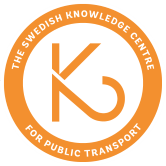This paper evaluates the welfare effects of optimizing bus service fares and frequencies in small cities by modeling street congestion and crowding in public transport vehicles. The model is calibrated to the Swedish city of Uppsala. A simple demand model is used. Sensitivity analyses suggest that this is sufficient for representing important welfare effects. The results indicate that there would be large, robust welfare gains from reducing public transport supply in Uppsala, especially in the outer zone of the city where reductions of supply would be large compared to the current situation. The welfare gains from adjusting fares would be smaller.
